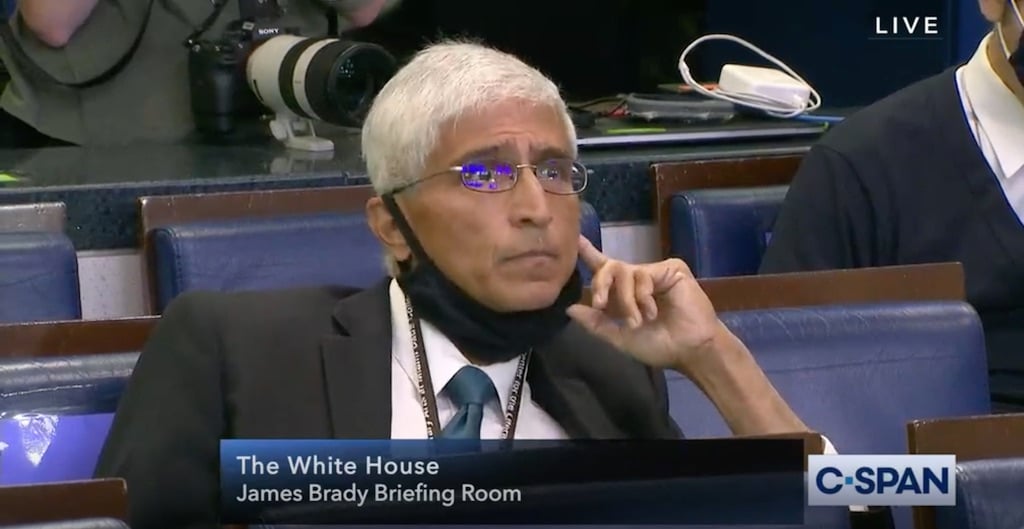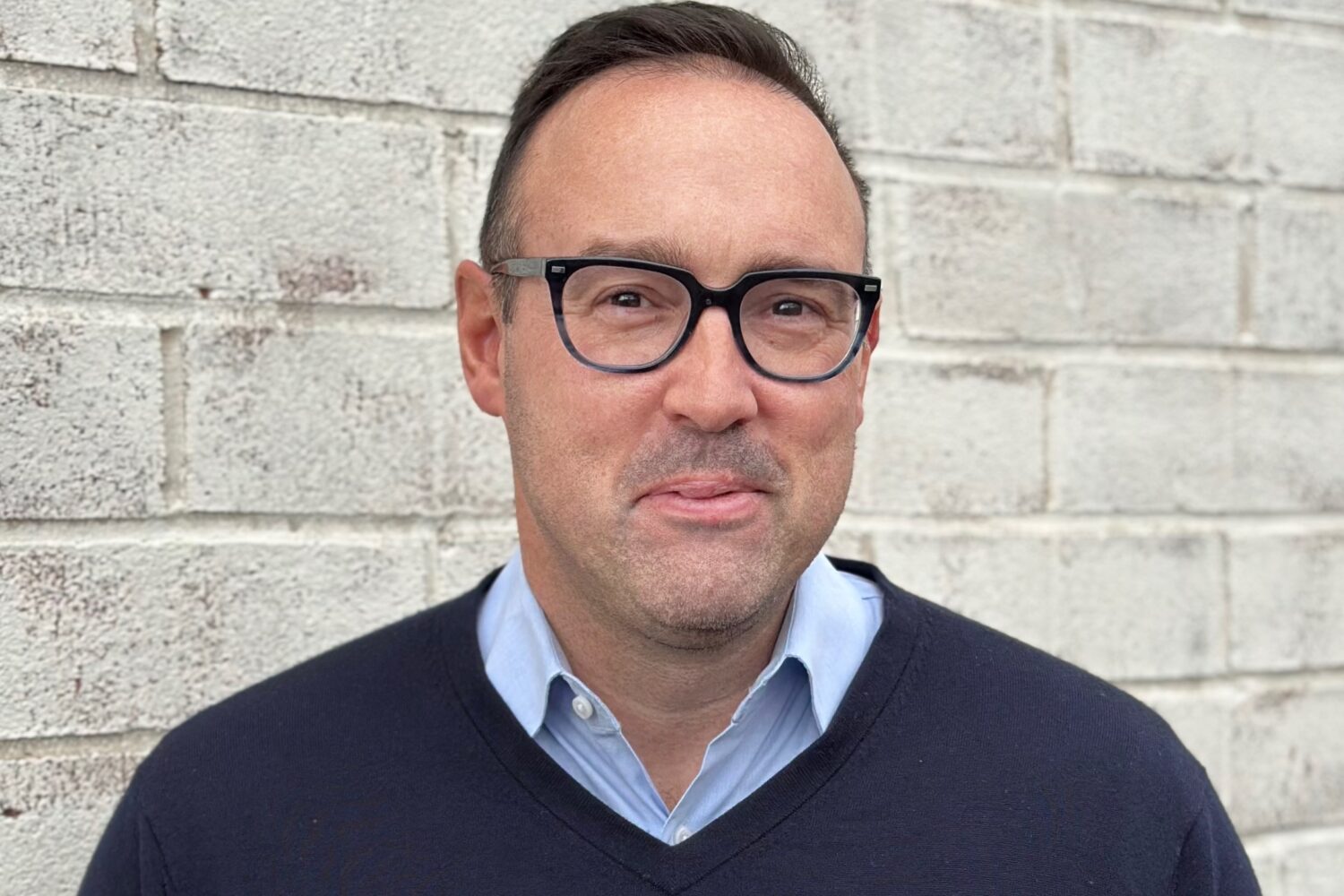HuffPost senior White House correspondent S.V. Dáte got a rare opportunity to ask President Trump a question during a briefing Thursday. He decided to go big: “Mr. President, after three and a half years, do you regret, at all, all the lying you’ve done to the American people?” Trump didn’t answer, but the clip of the exchange went viral. Washingtonian got Dáte—who’s worked as a journalist for decades, with stints at the Associated Press, NPR, and National Journal—on the phone for a few minutes to ask him about the moment.
Why did you decide that yesterday was the time to ask the president your question?
Well, I had always, for months, thought that the next opportunity that I had to ask him a question, that would be the one that I would ask, because no one else seems to be asking it. And it seems to be the central thing to his presidency right now. You know, I work for HuffPost. It’s not like I get invited into the Oval Office for a one-on-one. So those opportunities that I have at a news conference are pretty rare. What’s happened though, with the coronavirus briefings, is we’re in a quasi-pool situation in the briefing room. So there’s fewer of us in there, meaning, depending on his mood, pretty much everyone in the briefing room can get a question.
What do you make of the fact that he didn’t even try to answer?
I had a range of possibilities that I thought might happen. That was my number-one guess. I mean, he did seem tired. He’s been seeming tired for many of his appearances lately, so maybe that was it. He just wasn’t in the mood to to get into a back-and-forth. But it was interesting that he either didn’t hear it or pretended not to hear it and then decided, after shaking his head a couple of times, maybe it was time just to move on to the next question.
One of my kids has very selective hearing when it comes to questions he doesn’t want to deal with.
I will say that I have noticed that he seems to have difficulty hearing questions from the back rows. So maybe it’s an actual physical thing and not just selective hearing, although there is that as well. He’s been asked difficult questions directly in front of him at his helicopter opportunities, and he pretends not to hear those.
Do you think Trump considers himself a liar?
Now, there’s a couple of theories on that. You remember Ted Cruz went off on this long rant about him the day of the Indiana primary back in 2016, and he said that Donald Trump, you could hook him up to a lie detector in the morning and ask him a question. He’ll give you one answer. Another one at noon, and a third one is dinnertime. And each time he’ll pass the lie-detector tests because each time he thinks he’s telling the truth. And maybe?
But I think in his core, he understands that he’s just making stuff up. He used to call up the people at Page Six in New York and say, you know, I’m having relations with this supermodel or that person. He must know that he wasn’t actually sleeping with, you know, Carla Bruni. That’s not something you would get confused in your head. So at some level, he must understand that he’s just lying. And how much of that is he wishes he were someone else or wishes he was more accomplished than he was, and how much he does just because he can’t think of what else to say at that moment and is just trying to get through that next five minutes, I don’t know.
You wrote about the effects of Trump’s mendacity in January. I just reread the piece and noticed you asked what problems his lying might cause during a disease outbreak.
I mean, I didn’t know at the time that we’d get to find out exactly and very soon how he would deal with such a thing. But yeah, I guess something that a lot of people don’t think about when they’re electing a President is: You ought to be thinking about the stuff that you haven’t thought of. What are the bad things that can happen that you need someone to be able to deal with, that you can’t even imagine right now? And too often people say, Well, I’d like to have a beer with this person or whatever. You don’t pick an airline pilot like that. You don’t pick doctors like that. So maybe this is a wake-up call that this is an important job, and maybe someone who just makes stuff up all the time to make themselves feel better is not ideal for that position.
I didn’t notice that anybody in the White House press corps followed up on your question. How good of a job do you think the press is doing in reckoning with Trump’s constant lying?
I think what’s happened is they just accept it as that’s who he is. And you know, I used to work for a wire service, I used to work for AP, I know what a daily deadline is, and I get that you come in with an idea of writing a particular story on a particular thing, you want a particular answer, and then you can file and be done. And with a normal person, you can do that. But with this President you cannot.
I don’t think that element has sunk in to enough of my colleagues, that it doesn’t matter what he said about the payroll tax or about, you know, the F-35 or about the coronavirus vaccine, because he’s just making it up. What difference does it make what he says? To think that asking him repeatedly about these very specific topics is going to make one little bit of difference in the end is ridiculous. And you know, some of my colleagues were not happy that I did that, because they fear, I think, that the general level of access might decrease if he thinks he’s going to get questions like that. But really, this is democracy, and democracy only works if we’re getting accurate information from those people. They work for us. They’re not doing us a favor by telling us what they’re doing. It’s kind of their job.
Did anybody at the White House say anything to you afterward?
You know, my pool reports are somewhat different from most of the others’. I’ll fact-check him in real time, where a lot of people are unwilling to do that. So they know what they’re getting with me. And you know what? This is the advantage, one of the few, of being a little older: I’ve been doing this professionally for longer than many of them have been alive. So they know I’m not really interested in hearing from them about how I should be doing my job.
Do you have any plans for what you’re going to ask if he calls on you again?
I might just ask the same one. I might say, “Mr. President, you know, something happened and I didn’t quite hear your answer or you chose not to answer. But do you have any regrets about this?” Because maybe things would have been different. You know, and I’m not the first to ask this. There have been some of my colleagues have asked repeatedly.
In fact, I tried to ask this question back in March. I started my question with, “Mr. President, you have a credibility problem, a new NPR poll shows,” and I was gonna segue right to “Do you regret all this dishonesty?” He started, Well, you know, I’ve got polls that show me at 96 percent with Republicans and sleepy Joe Biden and all kinds of stuff, and he moved on. I learned my lesson there: no preface, you need to get to the question.
This conversation has been condensed and lightly edited.



















